Secretary of State John Kerry Calls Climate Inaction "Just Plain Immoral"
In a passionate address yesterday, Secretary of State John Kerry called inaction on carbon pollution “just plain immoral,” as it is “gambling with the future of Earth itself.” Kerry’s remarks were made at the Atlantic Council in Washington, D.C., setting the stage for this December’s international climate negotiations in Paris.
“Lincoln took risks, Gandhi took risks, Churchill took risks, Dr. King took risks, Mandela took risks, but that doesn’t mean that every risk-taker is a role model. It’s one thing to risk a career or a life on behalf of a principle or to save or liberate a population,” Kerry said. “It’s quite another to wager the well-being of generations and life itself simply to continue satisfying the appetites of the present or to insist on a course of inaction long after all the available evidence has pointed to the folly of that path.”
“Gambling with the future of Earth itself when we know full well what the outcome would be is beyond reckless,” he continued. “It is just plain immoral.”
“And it is a risk that no one should take. We need to face reality. There is no planet B.”
Kerry also called for a renewed global commitment to cutting carbon pollution to avoid the 2-degree-Celsius warming threshold agreed to by President Obama. Using language that could have practical policy implications, Kerry argued that energy-investment decisions must “include the long-term cost of carbon pollution.”
It is time, my friends, for people to do real cost accounting. The bottom line is that we can’t only factor in the price of immediate energy needs. We have to include the long-term cost of carbon pollution. We have to factor in the cost of survival. And if we do, we will find that pursuing clean energy now is far more affordable than paying for the consequences of climate change later.
Such decisions notably include the long-awaited Presidential determination on the Keystone XL tar-sands pipeline, which if built would have the carbon-pollution impact of 40 new coal-fired power plants.
The Secretary of State made reference to the news uncovered by the Florida Center for Investigative Reporting that Florida governor Rick Scott’s administration censored use of the words “climate change,” “global warming,” and “sea level rise.”
So when science tells us that our climate is changing and humans beings are largely causing that change, by what right do people stand up and just say, “Well, I dispute that” or “I deny that elementary truth?” And yet, there are those who do so. Literally a couple of days ago, I read about some state officials who are actually trying to ban the use of the term “climate change” in public documents because they’re not willing to face the facts.Now folks, we literally do not have the time to waste debating whether we can say “climate change.” We have to talk about how we solve climate change. Because no matter how much people want to bury their heads in the sand, it will not alter the fact that 97 percent of peer-reviewed climate studies confirm that climate change is happening and that human activity is largely responsible. I have been involved in public policy debates now for 40-plus years, whatever, since the 1960s. It is rare, rare, rare – I can tell you after 28 years-plus in the Senate – to get a super majority of studies to agree on anything. But 97 percent, over 20-plus years – that’s a dramatic statement of fact that no one of good conscience has a right to ignore.
Climate activist group Forecast the Facts is petitioning for an investigation.
Kerry’s speech had one factual misstep – he claimed that the first Senate hearings on climate change were held in 1988, when Dr. James Hansen famously warned Congress that global warming was already measurably affecting the climate.
Climate change is an issue that is personal to me, and it has been since the 1980s, when we were organizing the very first climate hearings in the Senate. In fact, it really predates that, going back to Earth Day when I’d come back from Vietnam. It was the first political thing I began to organize in Massachusetts, when citizens started to make a solid statement in this country. And I might add that’s before we even had an Environmental Protection Agency or a Clean Water Act or Safe Drinking Water Act or a Marine Mammal Protection Act or a Coastal Zone Management Act. It all came out of that kind of citizen movement. And that’s what we have to be involved in now. And the reason for that is simple: For decades now, the science has been screaming at us, warning us, trying to compel us to act.And I just want to underscore that for a moment. It may seem obvious to you, but it isn’t to some. Science is and has long been crystal clear when it comes to climate change. Al Gore, Tim Wirth, and a group of us organized the first hearings in the Senate on this, 1988. We heard Jim Hansen stand in – sit in front of us and tell us it’s happening now, 1988. So we’re not talking about news reports or blog posts or even speeches that some cabinet secretary might give at a think tank. We’re talking about a fact-based, evidence-supported, peer-reviewed science. And yet, if you listen to some people in Washington or elsewhere, you’d think there’s a question about whether climate change really is a problem or whether we really need to respond to it.
In fact, the first Senate hearings on climate change were 11 years earlier in 1977, when the science subcommittee of the U.S. Senate Committee on Commerce, Science, and Technology held a series of four hearings on the National Climate Program Act. The first House hearings on the same act of legislation were a year earlier.
The risk of fossil-fueled climate change was brought to the Congress’s attention by President Lyndon B. Johnson in his February 8, 1965 address on the environment, now over fifty years ago.
Transcript of full remarks:
Coal Giant Southern Company Claims It Will No Longer 'Engage In Influencing the Science' of Climate Change
The massive coal-powered utility Southern Company, recently revealed as a top funder of Harvard-Smithsonian climate denier Willie Soon, claims it is getting out of the business of climate denial. Southern Company’s contract with the Harvard-Smithsonian Center for Astrophysics included conditions giving it oversight over Soon’s research and a pledge to keep its funding secret.
The Southern Alliance for Clean Energy reports:We have been given assurance that Southern Company takes responsibility for the funding but stated that upper management did not have direct knowledge of this activity. We also appreciate the perspective that the funding contract with Dr. Soon was of a recurring nature and that Southern has stated that they will not renew funding contracts in this line of research. Southern further acknowledges that going forward, it is does not want to “engage in influencing the science.”
Although Southern Company may cease directly financing the very few legitimate scientists who promote disinformation about man-made cliamte change, it’s doubtful the company will stop supporting the massive climate-denial infrastructure that is nearly indistinguishable from the American right. In the 2014 cycle, Southern Company made hundreds of thousands of dollars in contributions to climate-science-denying Republicans. The utility giant has spent over $130 million since 2004 lobbying Congress, with a focus on blocking the regulation of coal pollution.
In 2014, Southern Company ran a “sponsored content” series on The New Republic’s website, entitled “Powering the Future, Honoring the Past,” which celebrated the utility’s “secure energy mix” of “the full portfolio of energy resources: nuclear, twenty-first-century coal, natural gas, renewables, and energy efficiency.”
“Corporate responsibility is part of our DNA,” one of the Southern Company “sponsored content” public-relations pieces claimed.
In a separate article, the New Republic’s Rebecca Leber criticized the Southern Company-Willie Soon relationship.
American Meteorological Society Objects to Congressional Investigation of Its Anti-Science Members
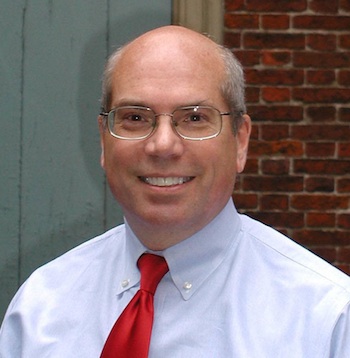
AMS Executive Director Keith Seitter
The investigation was launched by Rep. Raul Grijalva (D-Ariz.) following the revelations that the research of Dr. Willie Soon of the Harvard-Smithsonian Astrophysical Laboratory was secretly financed by the fossil-fuel industry, including Koch Industries, Exxon Mobil, and Southern Company. Soon testified before Congress in 2003 questioning the scientific consensus on fossil-fueled global warming.
Grijalva sent letters to the universities of seven other academics who have been Republican witnesses challenging the climate-science consensus, asking for testimony-related financial disclosure. Seitter responded by condemning the investigation.
"Publicly singling out specific researchers based on perspectives they have expressed and implying a failure to appropriately disclose funding sources — and thereby questioning their scientific integrity — sends a chilling message to all academic researchers," Seitter wrote in the AMS response. "Further, requesting copies of the researcher’s communications related to external funding opportunities or the preparation of testimony impinges on the free pursuit of ideas that is central to the concept of academic freedom."
Not mentioned by Seitter is that six of the seven targets of the Grijalva investigation are AMS members.
Judith Curry was elected a Fellow of AMS in 1995 and a councillor of AMS in 1997. John Christy received a Special Award from AMS in 1996, and was elected a Fellow in 2002. David Legates has been the faculty advisor to the Student Chapter of AMS and is an AMS certified consulting meteorologist. Richard Lindzen has received AMS's Meisinger and Charney Awards and was a member of the AMS Council. Robert Balling is a member and frequent presenter at AMS conferences. Roger Pielke Jr is an AMS member.
Pepperdine and American Enterprise Institute historian Steven Hayward is the only investigative target not in the American Meteorological Society.
These AMS members are notable for their public denunciation of the scientific community and specific scientists, including other members of AMS.
Below are some examples.
"The problem is that Obama is listening to scientists that are either playing politics with their expertise, or responding to a political mandate from the administration (probably a combination of both). Not just administrators in govt labs (e.g. [Gavin] Schmidt, [Tom] Karl), but think of the scientist networks of John Holdren and John Podesta: to me the scariest one one is [Michael] Mann to [Joseph] Romm to Podesta." - Judith Curry, 1/21/15
"When you're an alarmist, being wrong, lying, cheating, misleading the public and killing jobs simply do not count against you — even when the allegedly human-caused global warming stopped in 1996." - David Legates, 10/16/13
"[The hacked University of East Anglia email correspondence] is clear proof of what we have suspected: That these thugs have strong-armed and subverted the peer review process by demanding they be reviewers of papers critical of their work, removing editors who are not predisposed to their views, and even threatening to boycott journals that publish papers with which they disagree.” - David Legates, 1/18/10
"Because this issue has policy implications that may potentially raise the price of energy significantly (and thus essentially the price of everything else), the U.S. Congress should not rely exclusively on the U.N. assessments because the process by which they were written includes biased, false, and/or misleading information about one of the most murky of sciences – climate." - John Christy, 3/31/11
"[The Draft National Assessment on Climate Change] is much closer to pseudoscience than it is to science. . . . History tells us that when scientists willingly endorse sweeping governmental agendas fueled by dodgy science, bad things soon happen." - Robert Balling, 4/15/13
"It is quite amazing to see the contortions the IPCC has to go through in order to keep the international climate agenda going." - Richard Lindzen, 9/28/13
"Current global warming alarm hardly represents a plausible proposition. Twenty years of repetition and escalation of claims does not make it more plausible. Quite the contrary, the failure to improve the case over 20 years makes the case even less plausible as does the evidence from climategate and other instances of overt cheating." - Richard Lindzen, Congressional testimony, 11/17/10
Hill Heat has previously compiled a list of dozens of attacks made by Roger Pielke Jr, a political scientist, against climate scientists.
Roger Pielke Sr, Pielke Jr's father and another climate scientist who has testified before Congress rejecting the climate science consensus, was elected a Fellow of AMS in 1982. Pielke Sr was a member of the AMS Committee for Statements on Weather Modification. AMS's official statement on climate change was issued in August 2012, after significant delay. Pielke Sr was a likely source of such delay, as he strongly advocated for changes to weaken the statement. Pielke Sr has accused fellow AMS members including Tom Karl, Ben Santer, Tom Peterson, Tom Wigley, and Peter Thorne of "inappropriate" behavior, "collusion," and "conflicts of interest" to suppress dissenting views [his].
This is not the first time the executive director of the AMS has criticized efforts to hold climate deniers publicly accountable.
Seitter previously criticized the science-activist organization Forecast the Facts for "apply[ing] public pressure" on "broadcast meteorologists who are identified as 'deniers' based on views they have expressed with respect to climate change."
Dozens of television weather reporters who have attacked climate science and scientists are AMS members. At least twenty television weathermen who publicly reject basic climate science are AMS Certified Broadcast Meteorologists, the society's seal of approval granting them scientific legitimacy in their role as weather and climate communicators.
"The AMS maintains that peer-review is the appropriate mechanism to assess the validity and quality of scientific research," Seitter wrote, "regardless of the funding sources supporting that research as long as those funding sources and any potential conflicts of interest are fully disclosed."
The pursuit of that disclosure is, of course, the stated purpose of Grijalva's investigation, as the scientific community failed to ensure such disclosure in the case of Willie Soon.
According to the AMS bylaws:
Members should conduct themselves in an ethical manner and reflect dignity and honor on their profession. Members should base their practice on sound scientific principles applied in a scientific manner. Members should not direct their professional activities into practices generally recognized as being detrimental to, or incompatible with, the general public welfare. Members should refrain from making exaggerated or unwarranted claims and statements.
Either the claims made by AMS and the rest of the global scientific community are exaggerated, unwarranted, and detrimental to the general public welfare, or the claims of the academics under investigation are. Either the burning of hundreds of billions of tons of fossil fuels is disrupting the climate and threatening the public welfare, or the global scientific community has been corrupted into deceiving the general public into policies that would unnecessarily transform global energy production through massive government intervention. Either the climate conspiracy theorists are ethical AMS members, or all of the other members are.
For decades now the AMS has looked the other way and pretended this fundamental conflict within its ranks does not need to be resolved.
The American Meteorological Society seems uninterested in maintaining the ethical standards of its members and defending scientific integrity. Its executive director is compounding the error by criticizing Rep. Grijalva for taking action to do just that.
UPDATE: The AMS letter has been endorsed by industry-funded science denier Steven "Junkman" Milloy. In a tweet linking to Seitter's letter, Milloy wrote, "The new climate CONSENSUS is that skeptic persecutor @RepRaulGrijalva is an idiot."
Rep. Grijalva Asks for Conflict-of-Interest Disclosures from GOP's Go-To Climate Science Witnesses
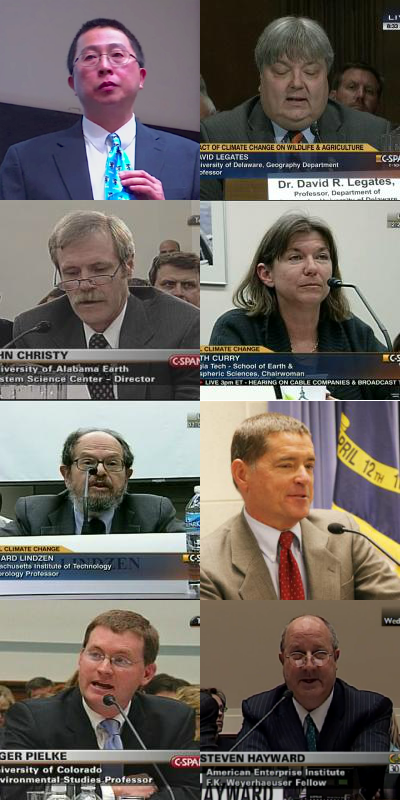
Climate-disinformation academics (clockwise from top left): Willie Soon, David Legates, Judith Curry, Robert Balling, Steven Hayward, Roger Pielke Jr, Richard Lindzen, John Christy
Over the weekend, multiple news organizations reported on the undisclosed funding of Harvard-Smithsonian's Dr. Willie Soon by Koch Industries, Exxon Mobil, Southern Company, and other greenhouse polluters. "There are just so many things that we do not know about how the climate really works and what are the factors that cause it to change," Soon testified before the U.S. Senate in 2003, "to really jump to the conclusion that it will all be CO2."
Rep. Raul Grijalva (D-Ariz.), the ranking member of the House Committee on Natural Resources, is asking the universities of seven academics, some of whom are climate scientists, others social scientists, who are part of a small stable of repeat Republican witnesses on climate science and policy.
Soon and the targets of this investigation have appeared at least three dozen times before Congress over the past twenty-five years to question the scientific need to limit greenhouse pollution.
"I am hopeful that disclosure of a few key pieces of information will establish the impartiality of climate research and policy recommendations published in your institution's name and assist me and my colleagues in making better law," Grijalva wrote. "Companies with a direct financial interest in climate and air quality standards are funding environmental research that influences state and federal regulations and shapes public understanding of climate science. These conflicts should be clear to stakeholders, including policymakers who use scientific information to make decisions. My colleagues and I cannot perform our duties if research or testimony provided to us is influenced by undisclosed financial relationships."
The letters request the institutions' disclosure policies, drafts and communications relating to Congressional testimony, and sources of external funding for the academics in question.
The disclosure requests are needed because Congressional "truth in testimony" rules require witnesses to disclose government funding sources, but not private or corporate funding. Under Republican control, the rules are unevenly implemented, with not-for-profit witnesses required to submit pages of additional disclosures, while corporate-sector witnesses are not.
The seven academics who dispute the scientific consensus on anthropogenic global warming who have been asked to disclose their funding are (dates of Congressional testimony in parentheses):
- David Legates, Department of Agricultural Economics & Statistics, University of Delaware climatologist (6/3/14, 7/29/03, 3/13/02)
- John Christy, University of Alabama atmospheric scientist (12/11/13, 9/20/12, 8/1/12, 3/31/11, 3/8/11, 2/25/09, 7/27/06 (video), 7/20/06, 5/13/03, 5/2/01, 5/17/00, 7/10/97)
- Judith Curry, Georgia Institute of Technology climatologist (1/16/14, 4/25/13, 11/17/10, 4/26/07, 7/20/06)
- Richard Lindzen, Massachusetts Institute of Technology atmospheric physicist (11/17/10, 5/2/01, 7/10/97, 1991 (Senate), 10/8/91)
- Robert C Balling Jr, Arizona State University geographer (3/6/96; North Carolina Legislature 3/20/06)
- Roger Pielke Jr, University of Colorado political scientist (12/11/13, 7/18/13, 7/20/06, 5/16/07, 1/30/07 (video), 7/20/06, 3/13/02)
- Steven Hayward, School of Public Policy, Pepperdine University historian (5/25/11, 10/7/09, 4/22/09, 3/12/09, 3/17/99)
Update: Further appearances by Curry, Pielke Jr, and Christy in 2006 and 2007 have been added (h/t Dr. Curry).
Republicans Send Keystone XL Bill to President after Ceremonial Signing
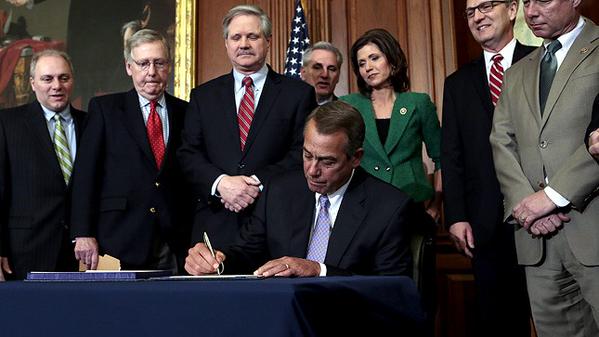 Turning the process of enrolling a bill into stagecraft, Congressional Republicans ceremoniously signed their bill expediting the foreign-owned Keystone XL tar sands pipeline today. President Barack Obama has promised a veto of the legislation. The Hoeven-Manchin bill, S. 1, passed the Senate 62-36 and the House 270-152, neither achieving the two-thirds majority necessary for a veto override.
Turning the process of enrolling a bill into stagecraft, Congressional Republicans ceremoniously signed their bill expediting the foreign-owned Keystone XL tar sands pipeline today. President Barack Obama has promised a veto of the legislation. The Hoeven-Manchin bill, S. 1, passed the Senate 62-36 and the House 270-152, neither achieving the two-thirds majority necessary for a veto override.
Emulating the ceremony of a presidential bill signing, Senate majority leader Mitch McConnell (R-Ky.) and Speaker of the House John Boehner (R-Ohio) signed the enrolled legislation with large metal pens on a table decked with navy blue as other Congressional Republicans stood watching. Sen. John Hoeven (R-N.D.), who received the ceremonial pen, argued that vetoing the bill would help OPEC. According to the Hill’s Laura Baron-Lopez, “Hoeven asked if the administration really wants to rely on OPEC with the current terror situation with the Islamic State in Iraq and Syria.”
Canadian Paper Found Guilty of Defaming Climate Scientist Andrew Weaver with "Climategate" Smears
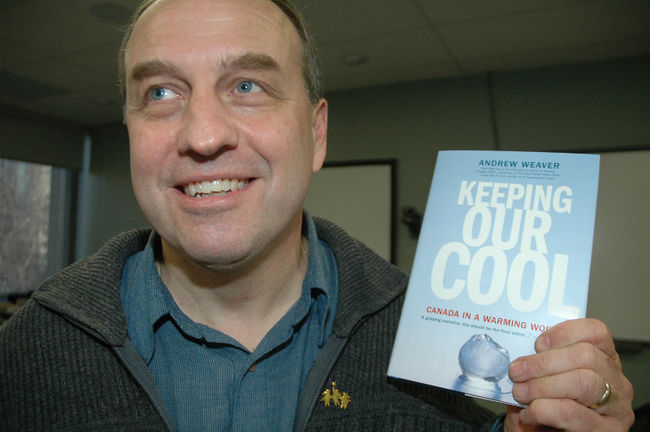 The conservative Canadian newspaper National Post and several of its reporters have been found guilty of defaming a climate scientist in numerous articles that attacked his character. The defendants - the Post, its publisher Gordon Fisher, and its journalists Terence Corcoran, Peter Foster, and Kevin Libin - have to retract all their articles about climate scientist Andrew Weaver and pay $50,000 in general damages jointly.
The conservative Canadian newspaper National Post and several of its reporters have been found guilty of defaming a climate scientist in numerous articles that attacked his character. The defendants - the Post, its publisher Gordon Fisher, and its journalists Terence Corcoran, Peter Foster, and Kevin Libin - have to retract all their articles about climate scientist Andrew Weaver and pay $50,000 in general damages jointly.
The judge in the case, Justice Emily Burke, did not find the defendants guilty of malice, merely that they "deliberately created a negative impression of Dr. Weaver" because of their climate-change denial and "have been careless or indifferent to the accuracy of the facts."
Dr. Andrew Weaver is one of the world's pre-eminent paleoclimatologists, a professor at the University of Victoria since 1992. He has spent considerable time working to educate the public on climate change, writing Keeping Our Cool: Canada in a Warming World in 2008 and acting as a lead author for every IPCC report since 1995. During the
In a series of articles and editorials, the Post claimed Weaver, as "Canada's warmist spinner-in-chief," was part of a global scientific conspiracy to concoct fear about fossil-fueled global warming. This "Climategate" smear against varied climate scientists was promoted by conservative media worldwide during the 2009 Copenhagen climate talks. While other scientists were being smeared following the hacking of a set of email correspondence, Weaver was the victim of an office break-in. The Post then falsely claimed Weaver blamed the oil industry for the burglary. The Post also falsely claimed Weaver was trying to dissociate himself from the IPCC and was generally corrupt and deceitful. In 2010, Weaver filed suit against the Post, after years of asking for corrections and retractions.
Justice Burke found the defendants' claims that their articles did not defame Weaver's character completely unconvincing. She found, instead, they lied and defamed Dr. Weaver. According to Burke, they "altered the complexion of the facts and omitted facts sufficiently fundamental that they undermine the accuracy of the facts expressed in the commentary to the extent the facts cannot be properly regarded as a true statement of the facts."
As she wrote in her decision:
Essentially, the allegations of the defamatory character of the words in the four articles can be summarized as the following innuendos or inferences that Dr. Weaver:(a) attempted to divert public attention from the IPCC and Climategate scandal by fabricating stories about the involvement of the fossil fuel industry with respect to the break-ins at his office, theft of emails from a UK University, and hack attacks at the Centre;
(b) engaged in deceptive misconduct in the news media to do so;
(c) engaged in willful manipulation and distortion of scientific data for the purposes of deceiving the public in order to promote a public agenda;
(d) in doing so, is motivated by a corrupt interest in receiving government funding and financial rewards;
(e) is wilfully concealing scientific climate data;
(f) knows or believes the IPCC reports concerning global warming are unscientific and fraudulent and seeks to avoid personal accountability for the manipulation/distortion of those reports by disassociating himself from that organization;
(g) has deceitfully or incompetently linked current weather and temperature events with global warming;
(h) authored a deceitful and manipulative work of agitation propaganda known as The Copenhagen Diagnosis; and
(i) is untrustworthy, unscientific and incompetent.
As of this writing, the National Post has not yet removed the offending articles from its website.
The full judgment can be found here.
Coral Davenport Repeats Keystone XL 'Little Impact on Climate' Falsehood
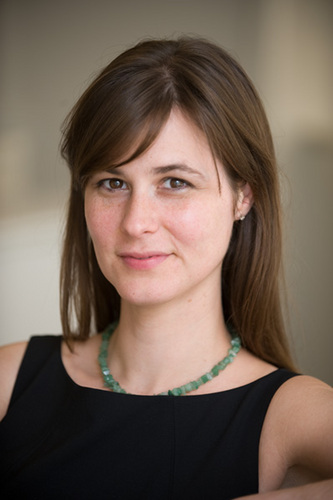
Coral Davenport
Coral Davenport, one of The New York Times’ few environmental reporters, is repeating her past mistakes on Keystone XL reporting. The Keystone XL pipeline would connect Canada’s tar sands to Texan oil refineries, allowing the high-carbon product to reach the global oil market. Over its forty-year intended lifetime, the pipeline’s tar sands crude would have a greenhouse-pollution footprint of about 7 billion tons of carbon dioxide, the equivalent of forty new coal-fired power plants. By any reasonable measure, the Keystone XL pipeline is a major piece of infrastructure for the Canadian tar-sands industry and a significant threat to a safe climate.
In a recent story entitled “Experts Say That Battle on Keystone Pipeline Is Over Politics, Not Facts,” Davenport claimed that the tar-sands pipeline has little real policy significance.But most energy and policy experts say the battle over Keystone overshadows the importance of the project as an environmental threat or an engine of the economy. The pipeline will have little effect, they say, on climate change, production of the Canadian oil sands, gasoline prices and the overall job market in the United States.
On Earth Day last year, Davenport penned a nearly identical story, writing, “when it comes to the pipeline’s true impact on global warming, energy and climate change experts — including former Obama administration officials — say Keystone’s political symbolism vastly outweighs its policy substance.”
The original version of last year’s story understated the scale of the tar-sands pipeline’s greenhouse pollution by a factor of ten.
Davenport’s new story relies on experts who have done work on behalf of the oil and gas industry, leading with Robert Stavins, the influential Harvard Kennedy School economist who has studied climate policy for the last thirty years. Stavins claims:“The political fight about Keystone is vastly greater than the economic, environmental or energy impact of the pipeline itself. It doesn’t make a big difference in energy prices, employment, or climate change either way.”
An active supporter of the boom in natural gas extraction, Stavins also opposes the climate movement’s campaign to divest universities and other institutions from the fossil fuel industry.
It does not appear that Stavins has conducted any published work on Keystone XL or the economics of Canadian tar sands. However, a Kennedy School doctoral candidate named Gabe Chan has analyzed the climate economics of Canada’s tar sands. Chan and his co-authors found that under global policy that maintains a safe climate, Canada’s tar-sands development would collapse. The study raises serious questions about whether approval of Keystone XL is consistent with the international climate commitments the State Department has made at the direction of President Barack Obama.
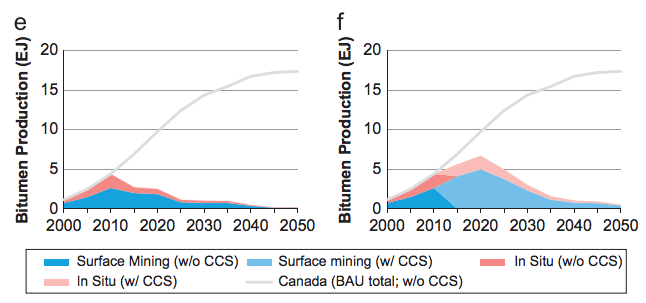
With climate policies implemented worldwide, the Canadian bitumen production is significantly reduced. Left (e) shows global climate policy scenario, right (f) global climate policy with carbon-capture-and-sequestration technology. (Chan et al. 2012)
The other people denoted as “experts” by Davenport are Robert McNally, a former George W. Bush official who now works as an professional advocate for the oil and natural gas industry, and Christine Tezak, a pipeline-finance analyst, who bet that Keystone XL would be approved in 2011 (as did her current boss, Kevin Book).
Stavins has done consulting work for Chevron, Exelon, Duke Energy, and the Western States Petroleum Association. Neither McNally nor Tezak publicly disclose their clients who are part of or invest in the fossil-fuel industry. None have a scientific background, and none have published work analyzing the environmental impact of the Keystone XL pipeline.
In the words of climate scientist John Abraham, “People who think Keystone is a minor issue don’t understand science and they sure don’t understand economics.”
Paid by Peabody, Laurence Tribe Argues Coal Is 'Bedrock' to Economy
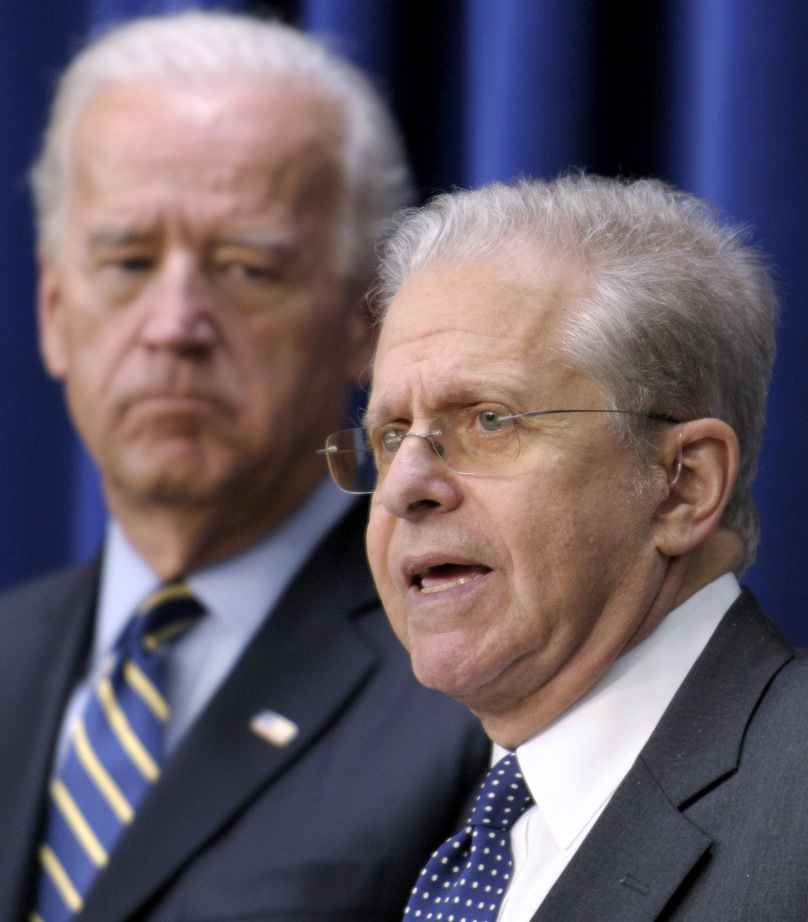 Laurence Tribe, the Harvard law professor who argued the losing side of Bush v. Gore, is now defending the coal industry against the Environmental Protection Agency's planned rules for greenhouse pollution from power plants. In a submission to the EPA's comment period for the Clean Power Plan, Tribe and Peabody Energy's notorious climate-science-denying lobbyist Fred Palmer argued that coal is a "bedrock" of the United States economy.
Laurence Tribe, the Harvard law professor who argued the losing side of Bush v. Gore, is now defending the coal industry against the Environmental Protection Agency's planned rules for greenhouse pollution from power plants. In a submission to the EPA's comment period for the Clean Power Plan, Tribe and Peabody Energy's notorious climate-science-denying lobbyist Fred Palmer argued that coal is a "bedrock" of the United States economy.
In short, coal has been a bedrock component of our economy and energy policy for decades. The Proposed Rule, which manifestly proceeds on the opposite premise, thus represents a dramatic change in directions from previous Democratic and Republican administrations.
"It is a remarkable example of executive overreach and an administrative agency’s assertion of power beyond its statutory authority," Tribe and Peabody Energy wrote, in strident language reminiscent of Fox News rhetoric. "Indeed, the Proposed Rule raises serious constitutional questions."
Tribe and Peabody put great weight in the past history of coal's importance to the U.S. economy, as opposed to its future. Hillary Clinton, John F. Kennedy, and Jimmy Carter get special mention.
Both Democrats and Republicans should stand in strong support of the rule of law. And both Democratic and Republican Administrations have promoted the prudent use of domestic coal in order to reduce dependence on imported oil. In contrast, the Proposed Rule will require a dramatic decline in coal-fired generation of electricity, in order to implement EPA’s system of state-by-state mandates. In fact, under EPA’s plan, the agency envisions that coal generation would be eliminated altogether in 12 states. The Proposed Rule thus reverses policies that reach back to John F. Kennedy. As Hillary Clinton observed in 2007, “I think you have got to admit that coal — of which we have a great and abundant supply in America — is not going away.”
Keystone XL Is Designed for a Burning Planet
The Keystone XL tar sands pipeline, now under consideration for approval by the U.S. Senate, would have a significant and dangerous impact on the climate, incompatible with the White House goal of a sustainable climate.
In line with scientific warnings, President Barack Obama and the U.S. State Department have committed to limiting global warming to below 2°C above pre-industrial levels. In the International Energy Agency’s 2°C scenario, global oil consumption would fall by 50 percent from current levels by 2050, within the intended operating lifetime of the Keystone XL pipeline.
The Keystone XL environmental impact statement instead assumes that global oil demand will increase over that time period. The baseline used is the Energy Information Administration’s 2013 Annual Energy Outlook, which projects that global oil consumption will increase by 30 to 40 percent by 2040. In that scenario, the world would be on a pathway for rapid and catastrophic global warming of 4 to 6°C (or greater) by 2100.
To have an 80 percent chance of staying below 2C warming, no more than 900 GtCO2 can be burned before 2050.
In the Keystone XL scenario, over 1700 GtCO2 are burned by 2040—nearly double the safe amount, with a decade to go.
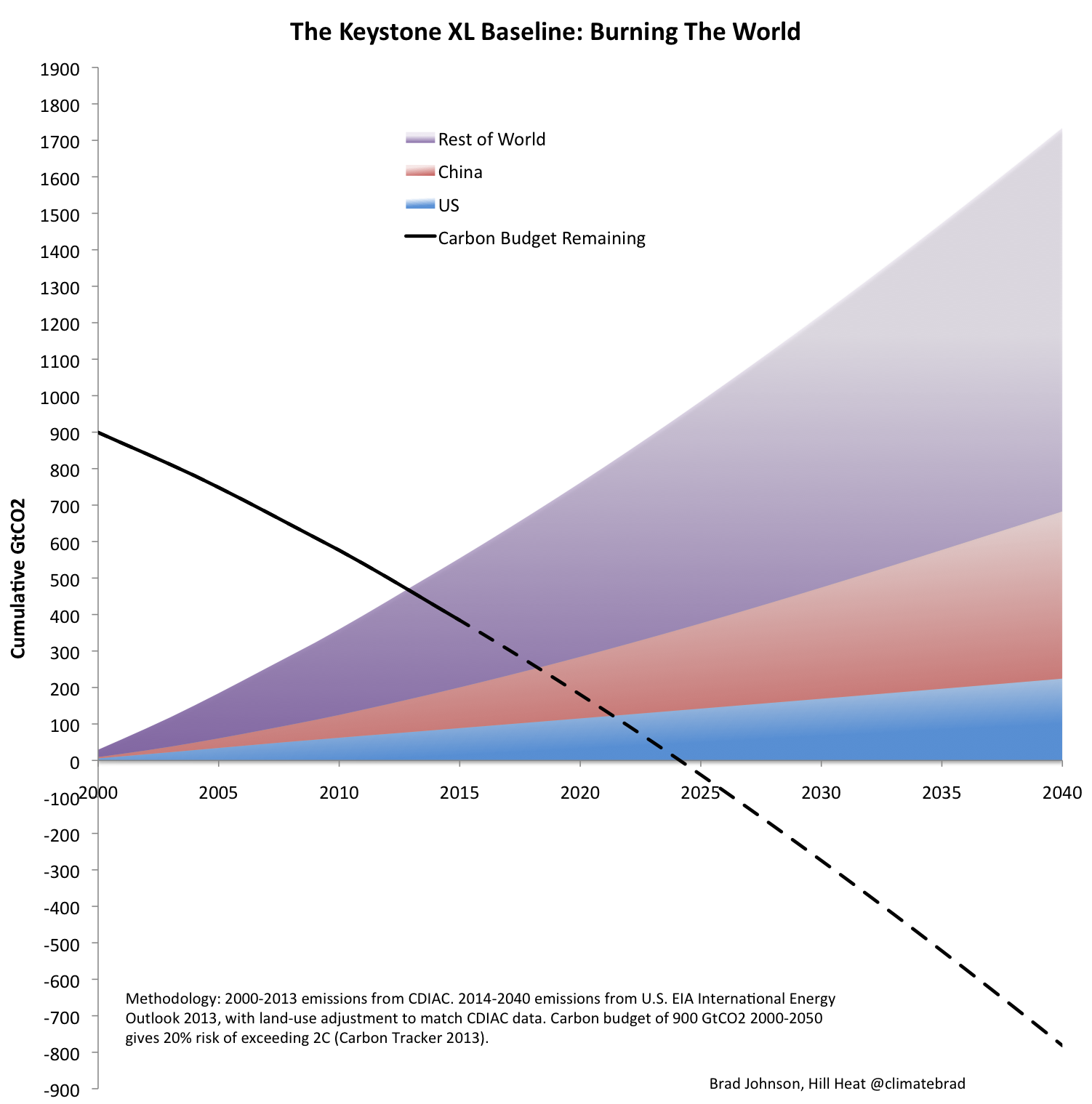
The International Energy Agency scenario reflects an estimated 2/3 chance of staying below 2C warming with the burning of 1260GtCO2 through 2050. Burning 1700 GtCO2 by 2040 would put the world on a catastrophic pathway of 3C warming or more.
The pipeline is intended to ship upwards of 830,000 barrels of tar-sands crude a day for a 40-year lifespan. The pipeline will add 120-200 million tons of carbon-dioxide-equivalent to the atmosphere annually, with a lifetime footprint of 6 to 8 billion tons CO2e. That’s as much greenhouse pollution as 40 to 50 average U.S. coal-fired power plants. Furthermore the Keystone XL pipeline is recognized by the tar-sands industry as a key spigot for the future development of the Alberta tar sands, which would emit 840 billion tons CO2e if fully exploited. The carbon dioxide emissions produced by oil that would be moved in this single pipeline would amount to 3 percent of U.S. greenhouse gas emissions, and half a percent of the global carbon footprint. Only thirty-two countries have larger annual footprints than this single tar-sands project.
Graphs: U.S. and China Climate Commitments Leave No Room For World
The climate commitments announced by Presidents Barack Obama and Xi Jinping in China are momentous given the political status quo, but they still leave human civilization on a catastrophic trajectory, a Hill Heat analysis shows.
The non-binding targets agreed to in Beijing — that China would peak in emissions by 2030 and the U.S. would accelerate emissions cuts to reach 80 percent of current pollution levels (74 percent of 2005 levels) by 2025 — are a positive step forward. Without such targets catastrophic warming is guaranteed.
President Obama reaffirmed that limiting global warming to less than 2°C (3.6°F) above pre-industrial levels is his goal, claiming the announced targets “means the United States is doing its part to contain warming to 2 degrees Celsius.”
What do the announcements actually mean in the context of what is needed?
Below, we explore the targets in the context of a “Russian roulette” 2C pathway, with pollution levels that scientists estimate lead to a one-in-five chance of exceeding 2C. (Ed.: Russian roulette odds are actually a bit better.)
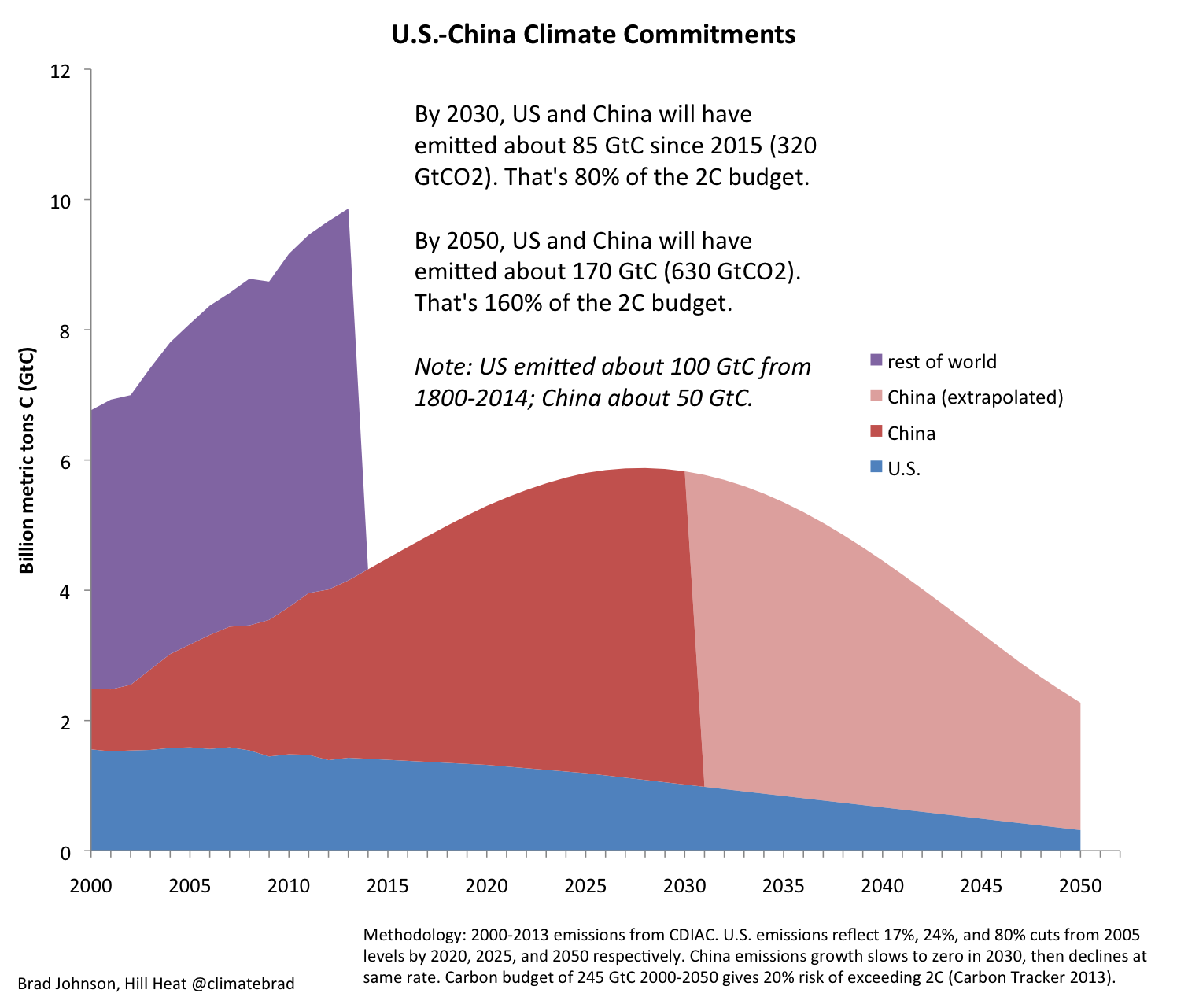
By 2030, US and China alone will have emitted about 80% of the carbon budget, leaving the other 75% of the global population with little to spare. By 2050, US and China will have emitted about 160% of the carbon budget, making the “Russian roulette” scenario impossible. To be clear, even 2C warming is highly risky, to say the least (Hansen et al, 2013).